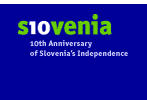 |
 |
|||||||||||
|
||||||||||||

|
|
|
"The dramatic and bloody story of war on the territory of the former Yugoslavia certainly demands the responsibility of all those who caused it. They must await their judgement in The Hague. Among them is also Slobodan Milosevic. Not out of vindictiveness, but for the sake of the authority of the principles of humanity and respect for human rights, which were so flagrantly violated by way of systematic violence, war crimes and genocide that the international community had to intervene. It is precisely in defence of these rights that the Tribunal was founded. The perpetrators must account for their actions there. At home they can also be held accountable for criminal activity, but that is a completely different level of accountability," emphasises President Kucan. In President Kucan's opinion, the reasons behind the conflicts of war in the Balkans lie in the manner of resolving the unsolved national issues. "They are trying to resolve them in a manner which could hardly be called modern, let alone post-modern. They stem from the principles of "blut und boden" and "lebensraum" ". "Throughout the crisis in the Balkans I have been missing a strong resoluteness of the international community to clearly state what principles are to be applied in today's civilised world to resolve national issues that are objectively difficult, and to assume responsibility for such a position. Resolving these issues cannot be left solely up to the Balkan nations. Were they capable of resolving the crisis on their own they would have already done so," says Kucan. "The process of dissolution of the former Yugoslavia is not over yet," estimates President Kucan, adding that problems in the Balkans "will remain there until one begins seeing this region as a volcano with multiple craters which erupt once here, once there. In other words, they will remain there until the cognition prevails that this volcano has a single eruptive magma embodied by the manners and ways of resolving the unsolved national issues." "Solutions must be sought within the existing political map of the Balkans", says President Kucan, and adds: "One needs to ask oneself what the meaning is of these words often heard in the Balkans: 'We can never live with them again' ". He is convinced that subscribing to such a philosophy of life would constitute a defeat of European democratic principles in the Balkans. "Even if the borders were to change, there will be people living on either side of the border who will have to reach agreements and live together. A modern, globalised world, a modern Europe is a Europe of co-operation. The right answer would therefore be: 'You are living together and will have to go on living together. You have to find a formula for common life. If not one with the other than at least one along the other. The international community will help you in this' " believes President Kucan, underlining the difference in Slovenia's position at the time of its gaining of independence: "Slovenians never said we couldn't live together with others. All we stated was that we cannot live in an undemocratic, totalitarian and hegemonistic regime as was being set up in Yugoslavia because it was smothering our national identity and was taking away our future. This is a great, essential difference! Not wanting to live in an undemocratic regime or not wanting to live together with someone because they're different, of different provenance, religion, language, etc." Says President Kucan regarding the current developments in Macedonia: "One needs to secure the sovereignty and indivisibility of the Republic of Macedonia. Solutions for the problems that emerged in Macedonia are offered by the modern democratic principles of protection and equality of national minorities in multi-ethnic communities. Such problems cannot be resolved with arms or terrorist violence." He also adds: "It is important that the international community remain principled and consistent in this respect and that it does not create - for pragmatic reasons - a uni-ethnic community in Kosovo and a bi-ethnic community in Macedonia, for example." |


